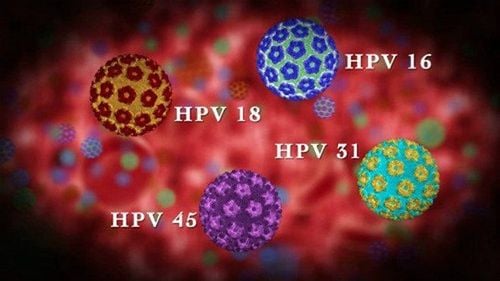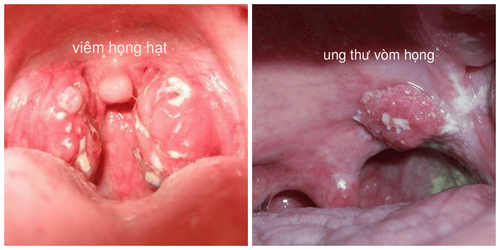This is an automatically translated article.
Nasopharyngeal cancer is a rapidly progressive disease, if not detected and treated early, the patient's survival time is very short. Initially, the disease only showed symptoms in the nasopharynx, but when the disease has metastasized, the symptoms are also expressed in the organs where the cancer cells have metastasized.1. Classification of nasopharyngeal cancer
According to the World Health Organization (WHO), nasopharyngeal cancer is classified into 3 types as follows:Carcinoma: is the most common cancer, accounting for 75% - 85% of cases. throat cancer. Differentiated carcinoma accounts for a low rate of 10% - 15%. Sarcoma is a rare form of cancer with an incidence of about 5%.
2. Progression of nasopharyngeal cancer in the world and in Vietnam
2.1 In the world Nasopharyngeal cancer occurs a lot in developing countries, especially countries in Africa and some Southeast Asian countries and is very rare in developed countries such as countries in Europe, some American countries.2.2 In Vietnam According to statistics, nasopharyngeal cancer is the leading disease among head and neck cancers with the rate of 9-10 patients/100,000 population/year.
The reason why developing countries have such a high incidence of diseases is because the economic development process is not balanced with the protection of the living environment, along with many negative cultural lifestyles that have not been eliminated, and important Most importantly, human consciousness is not high. Specifically, environmental factors such as air pollution, eating habits of high salt and fermented foods, smoking habits, heavy alcohol consumption in rural areas, habits of eating betel nut... the causes These combined with each other and maintained for a long time increase the risk of nasopharyngeal cancer.

Theo thống kê ung thư vòm họng là bệnh đứng đầu trong các ung thư vùng đầu mặt cổ với tỷ lệ 9 - 10 bệnh nhân/100.000 dân/năm
3. Disease progression through cancer stages
3.1 Early stage In the early stages of the disease, there are no signs of metastasis, slow progression, few systemic symptoms. This phase usually lasts 1-2 years. If the patient is diagnosed early and treated correctly, the chances of recovery are very high.The course of the disease in the early stages is similar to the symptoms of a cold with 80% of patients with nasopharyngeal cancer have a dull headache and often on one side of the head, 70% of patients have tinnitus, most of them tinnitus in one ear. . Stuffy nose, runny nose. There may even be a purulent nasal discharge due to associated sinusitis and occasional bloody spitting up.
3.2 Late stage At this time, the disease has metastasized to other organs, the disease symptoms are no longer within the nasopharynx, but there are systemic symptoms. The disease progresses rapidly and is often fatal because the tumor spreads to the base of the skull or from metastases to important organs in the body such as the lungs, liver, and bones.
Manifestations of late stage disease are more severe. Patients with constant headache, sometimes severe pain, increasing tinnitus can lead to hearing loss, deafness, otitis media on the same side due to superinfection. Continuous stuffy nose, runny nose with bloody mucus, nosebleed. Neck lymph nodes are usually located on the same side as the tumor and it is because of this abnormal swelling that the patient needs to see a doctor. Some patients come with distant metastases such as lung metastases, liver metastases... The disease spreads to any organ that will have symptoms in that organ. For example, if metastases to the lungs can cause difficulty breathing, airway obstruction; in the liver causing jaundice, loss of appetite.
4. The extent of spread and signs to recognize the tumor has metastasized

Ung thư vòm họng có mức độ lây lan như thế nào
4.2 Bilateral spread Tumors in the eustachian tube tend to spread laterally along the Eustachian tube to the middle ear, causing tinnitus, pronounced hearing loss on one side. Pain in the ear spreads to the mastoid area, causing ear discharge with blood and a rotten smell. Ear endoscopy showed a perforated tympanic membrane, warts, necrosis, and bleeding easily. If more aggressive, the tumor can pass through the tympanic cavity and spread to the external ear canal.
4.3 Downward spread U spread below the oropharynx, affecting the voice, the ability to swallow. Unfortunately, Trotter syndrome can include deafness, cleft palate, and pharyngeal paralysis.
4.4 Cancer spread to the base of the skull causing intracranial syndrome including increased intracranial pressure and paralysis of the cranial nerves that can cause blindness, pain in the forehead and orbit, hemifacial numbness, muscle paralysis Chewing causes paralysis of the pharynx, pharyngeal membrane paralysis, paralysis of the sternocleidomastoid muscle, trapezius muscle, and paralysis of the tongue.
Understanding the danger level of oropharyngeal cancer, Vinmec International Hospital has applied the Package for screening and early detection of cancers of the oropharynx, pharynx and larynx in the health examination service for cancer patients. letters. When registering for this Cancer Screening Package, customers will be screened through general otolaryngology activities using hard or soft endoscopes and software ultrasound.
This health checkup package is applied to customers who are over 30 years old, have a high risk of oropharyngeal cancer such as a family history of the disease, frequent smoking and drinking alcohol, presence of unusual symptoms such as stuffy nose, runny nose, nosebleeds, swollen lymph nodes in the oropharynx,...
To know more about the health check package, customers directly go to the doctor to receive advice. , contact hotline: 0899.648.761, or register online HERE.
MORE:
Endoscopy NBI to screen for oropharyngeal cancer Is nasopharyngeal cancer contagious? Difference between nasopharyngeal cancer and common pharyngitis













